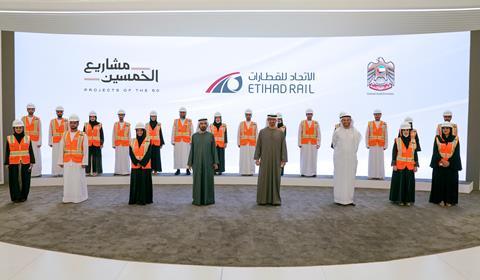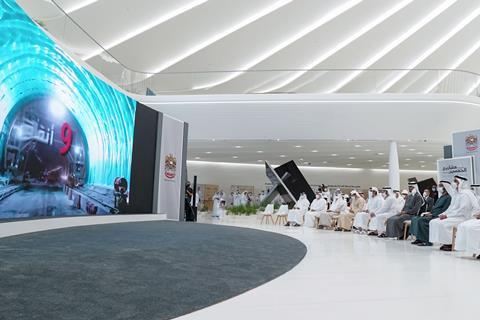
UAE: A three-stage integrated railway development strategy building on the Etihad Rail network was announced by the government on December 5, during the Expo 2020 world fair.
The 50bn dirham UAE Railways Programme aims to provide reliable transport connections between the emirates and support the economy, environment and tourism as part of the country’s wider ‘Projects of the 50’ strategy to accelerate national development. It encompasses three key initiatives.
The first is Freight Rail, which includes the existing Etihad Rail phase one freight services and the lines currently under construction under phase two.
The second is Rail Passenger Services. This project aims to provide 200 km/h trains connecting 11 cities within the UAE from Al Sila to Fujairah, offering journey times of 50 min from Abu Dhabi to Dubai and 100 min from Abu Dhabi to Fujairah. Ridership is expected to exceed 36·5 million passengers/year by 2030.
The third pillar is the Integrated Transportation Service. An innovation centre is to be established to drive the integration of ‘smart transport technology and systems’. Light rail lines would connect to the Rail Passenger System, facilitating local travel within cities, while technology is to be developed for smart trip planning and booking, and for integrating logistics operations with port and customs services.

The overall rail investment is put at 50bn dirham, of which 70% would be spent in the local market. More than 9 000 jobs are expected to be created in the railway and supporting sectors by 2030.
The UAE Railways Programme is predicted to create economic opportunities totalling 200bn dirham, according to the government. It would support the UAE’s efforts to preserve the environment and achieve carbon neutrality, contributing to a predicted reduction in carbon emissions by 70% to 80% of over the next 50 years; this reduction alone offers benefits valued at 21bn dirham. Modal shift would reduce road maintenance costs by 8bn dirham, and there would be tourism benefits estimated at 23bn dirham, with public benefits to the UAE economy valued at 23bn dirham.
‘Etihad Rail is the largest project to consolidate the strength of the union for the next 50 years’, said Sheikh Mohammed bin Rashid Al Maktoum, ruler of Dubai and UAE Vice-President & Prime Minister. ‘The UAE’s infrastructure is among the best in the world, and Etihad Rail will further enhance UAE excellence in the logistical field.’
Sheikh Mohamed bin Zayed Al Nahyan, Crown Prince of Abu Dhabi, added that ‘the national railways programme reflects the true meaning of integration into our national economic system, as we see the largest partnership between government entities at the federal and local levels. It comes to support a national vision to connect the country’s key centres of industry and production, open new trade routes and facilitate population movement, creating the most developed work and life environment in the region.’

















